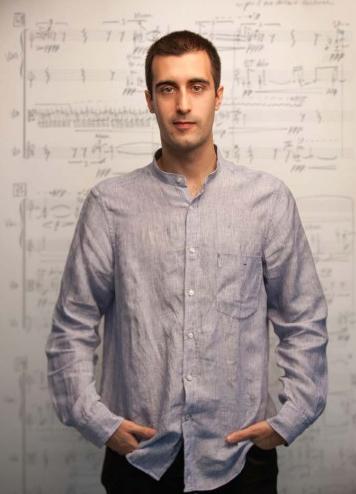Joan Magrané began studying music at the Vila-Seca Conservatory and got into composing under Ramon Humet. He has also been a pupil of Agustí Charles and Beat Furrer at the Kunst Universität in Graz and has attended courses and master classes by Pierre Boulez, Klaus Huber, Helmut Lachenmann, Kaija Saariaho, Georges Aperghis, Martin Matalon and Hilda Paredes.
First of all, congratulations for the prize you have just won. What does this recognition mean for your professional career?
It is a great honour and a great joy because if it is not through a prize of this kind it is impossible to be able to make your debut with an orchestral work in this country. I very much appreciate being able to gain this experience, which I consider essential. All my composition teachers and so many others that I admire have also won it; it is a luxury to join this club! What’s more ... secret desolation ... is a work that I am very happy with. It is the result of intense and intensive work that had been shelved; I wrote it almost two years ago in Graz, Austria, where I was studying on an Erasmus grant.
Poetry and other references, above all concerning mysticism, play a crucial role in your compositions. What role do they play exactly? What do you use as a source of inspiration?
I understand musical creation as a constant cultural dialogue with other artistic disciplines. I normally begin with ideas that come from the inspiration that reading a poem has given me. I am a great admirer of José Ángel Valente but also of our great Pere Gimferrer – his books such as L’espai desert (The Deserted Space) and Aparicions (Appearances) have had a great impact on my way of understanding music. Apart from poetry and prose I also get inspiration from looking at paintings or sculptures, by for example Miquel Barceló or Juan Muñoz. Obviously, other musical works also provide the spark for imagining new music, especially early music, by Josquin or Monteverdi, Madrigals and the doctrine of the affections, or even Wagner. Indeed the first passage of ...secret desolation... owes a great deal to the prelude from Parsifal. Everything that I take from others greatly influences my work in a metaphorical but also a technical sense, because eventually it definitively affects all the compositional parameters: structure, interval, timbre, and so on.
Your work has been performed in cities in many different countries, such as Vienna, Paris and Rome. Do you believe that your work is more appreciated abroad than in Catalonia?
It is certainly easier to be taken seriously at home if you are performed abroad ... but that’s not something exclusive to music. I think that this “seeing the world and ending up back home” is something very useful and profitable for everyone, a journey to make that always opens horizons and broadens the mind. I personally can’t complain; in Catalonia I have received a lot of support (which after all is what encourages you to carry on), for example from BCN216, from the Joventuts Musicals de Banyoles (thanks to whom I was recently able to premiere my 2nd string quartet with the magnificent Quartet Gerhard) or the Ateneu Barcelonès and the CrossingLines Ensemble, whose artistic director is my fellow composer Luis Codera.
In recent weeks Luis Codera Puzo has been awarded the Ernst von Siemens Foundation Prize and you won the Queen Sofia Prize for Composition. Is it a golden age for the new Catalan composers?
Yes it is! And we owe it in large measure to our teachers, who led the way and who have been enormously generous with us. I have to thank Ramon Humet, Agustí Charles and Mauricio Sotelo for much of what I am as a composer. Thanks also to composers like Hèctor Parra, we can travel around Europe with our heads held high. An example of this is that, in fact with the support of the Institut Ramon Llull, he was able to take part in the recent Huddersfield Festival where he was resident composer and where my Assaig de cant òrfic was performed. What’s more, we are a very diverse generation, and that too makes a difference.
To end with, can you tell us something about your future projects?
Of course! The next things are two works that I will be performing for the first time in Paris: the first, in May, is a trio for flute, violin and cello for doctorate students of the Conservatory and which is based on the Traité du funambulisme by Philippe Petit, a recent find that has very pleasantly surprised me. The second, in whose composition I am totally engrossed, is another trio (violin, viola and cello) for the Ircam ManiFeste to be performed in July by soloists of the Ensemble Intercontemporain, and it is a triptych inspired by pictorial sources, such as works by Dürer, Piero della Francesca and Duccio.







